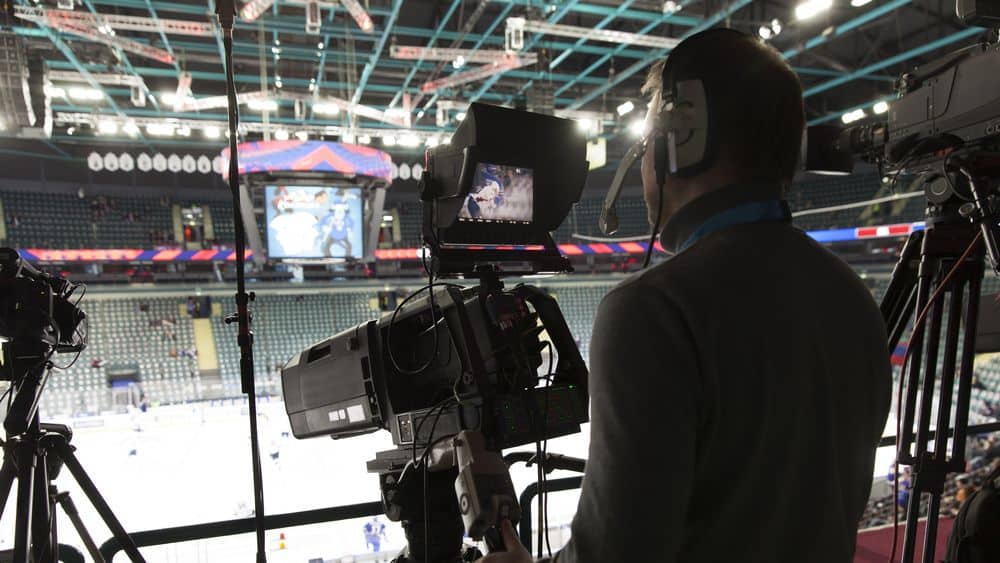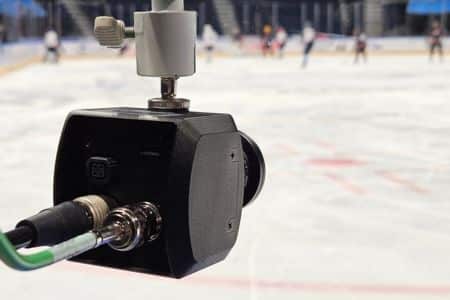
The NHL video coach may not stand behind the bench or skate under the lights, but they’re every bit as vital to a team’s success as the players and coaches you see on game night. They’re part of the heartbeat of the organization—analyzing every shift, goal, and play to help teams perform at their best.
If you’ve ever dreamed of turning your passion for hockey into a career, this could be your opening. Here’s how to build the skills, connections, and experience that can launch you into a full-time role with an NHL team.
What Does an NHL Video Coach Do?
At its core, the NHL video coach turns game footage into strategy. Their work connects technology, data, and coaching insight to help teams improve performance and prepare for every opponent.
Here’s what the job typically involves:

- Capturing and analyzing footage: Record games and practices from multiple angles, clip key plays in real time, and review footage afterward to identify strengths, weaknesses, and tactical patterns.
- Creating scouting reports Involves Breaking down opponents’ systems—such as forechecks, power plays, and penalty kills—to prepare detailed reports that help the coaching staff adjust their strategies.
- Tracking performance data: Monitor player shifts, ice time, faceoffs, and zone entries to identify trends and support lineup decisions.
- Managing video systems: Use professional tools such as Hudl, Sportscode, or Catapult to tag every pass, goal, and penalty for quick in-game or post-game review.
- Supporting coaches during games: Provide instant replay feedback, review potential offside or goaltender-interference challenges, and prepare video updates between periods.
- Developing players: Organize personalized clips to show players specific areas for improvement during meetings or training sessions.
- Maintaining the video archive: Keep the team’s internal video database organized and accessible for the coaching staff and analytics department.
- Collaborating with staff: Communicate clearly with the head coach, assistant coaches, players, and the equipment manager to ensure everyone understands the key takeaways from each video review.
In short, the video coach helps turn raw footage into actionable insight. The ideal candidate will possess a strong understanding of hockey systems, thrive in a fast-paced environment, and remain composed under tight deadlines—especially during back-to-back games or extended travel periods.
How Much Does an NHL Video Coach Make?
Many people hoping to work in professional hockey wonder what kind of salary they can expect as a video coach. According to ZipRecruiter, the average annual salary for an NHL video coach in the United States is approximately $52,887, or roughly $25 per hour.
While earnings vary depending on experience, team budget, and technical skills, most video coaches find the role both steady and rewarding. Those with strong software knowledge—especially in systems like Sportscode or Hudl—can advance into higher-paying positions such as Analytics Director, Assistant Coach, or Player Development Analyst.
Although the paycheck doesn’t match what players or head coaches earn, video coaches play a vital full-time role in shaping performance and strategy. For many, being part of an NHL team’s daily success is what makes the job truly worthwhile.
Skills and Education Needed to Become an NHL Video Coach
Most NHL video coaches hold a bachelor’s degree in Sports Management, Data Analytics, Digital Media, or a related area. A background in video production or computer technology is especially valuable, as the job relies heavily on editing and data systems.
Certifications in video editing, sports analytics, or performance technology can also help you stand out from the crowd. Proficiency in tools such as Hudl or Synergy Sports is often essential, as these are widely used across professional and collegiate hockey programs.
Continuing education through workshops, seminars, and internships, such as those listed on NHL Internships, is another effective way to stay current with the latest tools and trends in hockey technology.
Key Skills for an NHL Video Coach
Beyond education, teams seek candidates who thoroughly understand the game of hockey and can articulate their insights clearly and concisely. A great video coach can identify patterns, translate them into practical strategies, and explain these strategies to coaches and players in a way that enhances performance.
Essential skills include:
- Deep hockey knowledge and tactical awareness.
- Technical expertise with video systems and analytics tools.
- Strong analytical thinking to interpret data and spot trends.
- Excellent communication and collaboration with coaching staff and players.
- Organization and time management under tight game-day schedules.
Developing these skills and demonstrating your ability to connect technology with coaching insight will make you a standout candidate for future NHL video coach jobs.
How to Start Your Career as an NHL Video Coach

Breaking into the NHL takes persistence and a clear plan. Most NHL video coach jobs are earned through smaller roles that prove your reliability, skill, and passion for the game of hockey. Here’s how to get started:
Step 1: Get Hands-On Experience
Start by volunteering or interning with a local hockey club, college team, or junior program. Positions such as Video Coordinator or Team Operations Assistant can help you understand the day-to-day work of a professional coaching staff. Explore opportunities listed under NHL Internships on JobsInSports.com to begin building your experience.
Step 2: Build a Strong Portfolio
Save and organize examples of your work—such as scouting reports, video edits, and performance analyses. A portfolio that demonstrates your ability to track trends, interpret data, and communicate insights will set you apart when applying for full-time positions.
Step 3: Network Within the Hockey Community
Connections are key in hockey. Attend coaching clinics, analytics seminars, and industry events to meet current NHL and AHL staff. Personal introductions often open doors that online applications can’t.
Step 4: Apply for Entry-Level Roles
Once you’ve gained experience and established contacts, start applying for entry-level roles such as Video Assistant, Performance Analyst, or Hockey Operations Associate. For additional advice on applying effectively, read How to Get a Job with an NHL Team.
Step 5: Start in Lower Leagues and Work Up
Don’t hesitate to begin in the AHL, ECHL, or within a college athletic department—many current NHL video coaches started there. Smaller organizations let you learn multiple skills, from video cutting to game-day coordination, and often connect directly to NHL systems.
Step 6: Stay Flexible and Keep Growing
Demonstrate initiative, remain open to relocation, and continually enhance your technical and analytical skills. Whether you start in a central hockey hub like Chicago, Toronto, or Tampa Bay, or with a smaller feeder team, your dedication and adaptability will help you move up to the NHL level. Check the top NHL cities to work.
Career Growth Opportunities for NHL Video Coaches
Working as an NHL video coach can open doors to a wide range of roles within hockey organizations. The experience you gain in video operations, analytics, and communication can lead to long-term career growth both on and off the ice.
Common Career Paths
- Video Coordinator → Head Video Coach: Most professionals start in entry-level video or support roles before earning the title of Head Video Coach after a few seasons.
- Analytics and Strategy Roles: Many transition into positions such as Analytics Specialist, Performance Coach, or Player Development Analyst, where they apply their video experience to inform data-driven decision-making.
- Coaching Opportunities: Those with strong leadership and communication skills can move onto the bench as Assistant Coaches, working directly with players and the head coach.
- Front Office Positions: Some video coaches advance into hockey operations or management, contributing to scouting, player evaluation, and team-building decisions.
Expanding Opportunities in Hockey Technology
As the NHL continues to invest in data and performance tools, the demand for qualified video and analytics experts continues to grow. Teams are expanding their staff to include more technology-focused specialists—making now an excellent time to enter the field.
Beyond the NHL
The skills developed in video coaching are applicable across all levels of hockey. Many professionals go on to work with national programs, college teams, or private player development groups, where their analytical and technical expertise remains highly valued.
Step Onto the Ice: Your Chance to Launch a Career
Behind every highlight-reel goal is an NHL video coach turning game footage into strategy. This role goes beyond editing. It’s about teamwork, analysis, and communication. You’ll work closely with coaches, players, and even the equipment manager, utilizing your knowledge of the game of hockey and excellent communication skills to inform decisions that lead to game-winning outcomes.
If you’re passionate about hockey, start by learning video software, volunteering with your local athletic department, or assisting teams that need help with analytics. Each step builds the experience you’ll need to succeed.
When you’re ready, visit JobsInSports.com to explore verified NHL Jobs, internships, and exclusive access to The Network. Your path to the NHL doesn’t have to start on the ice—it can begin behind the screen, helping teams chase the next Stanley Cup.





